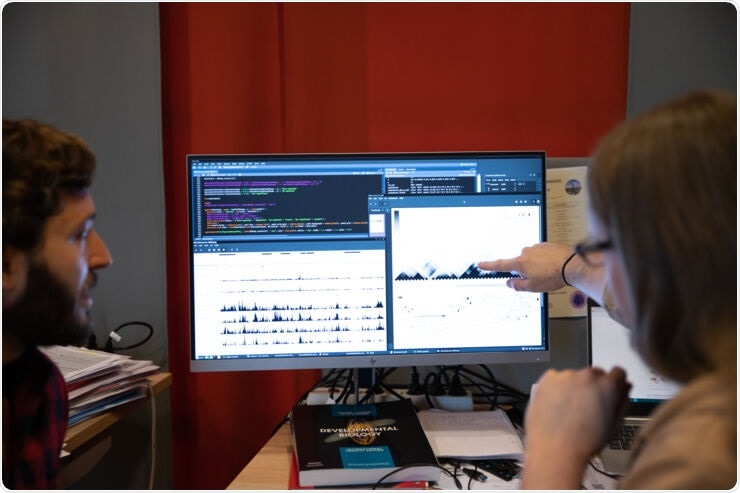Embryonic stem cells are capable of producing every cell type in the body. A group of scientists from Sweden, in association with teams from Switzerland and Canada, recently pinpointed a cellular mechanism that is vital for the ability of these cells to remain as stem cells.

Claudio Cantù (left) and Simon Söderholm (right) discuss the implications of the new discovery. Simon Söderholm points to the identification of a small region, within the vast genome, that contains the small group of genes identified in the new study, which is important for the ability of embryonic stem cells to decide whether to divide or become specialized cells. The researchers combined experimentation with sophisticated informatic analyses to identify the behavior of these genes. Image Credit: John Karlsson.
The findings provide the insight necessary to bring forth advances in regenerative medicine. The observations are published in the Cell Reports journal.
At the time of early development in most organisms, including humans, the embryo consists of cells that have the special ability to create every other cell type in the adult body. This capability is called “pluripotency.” The cells, named embryonic stem cells or ESCs, are hence thought to be the “parents” of all cells in the body.
ESCs can be separated and grown to employ a mix of growth-stimulating proteins that enables them to multiply and stay in their state as embryonic stem cells. This is of great importance in the area of regenerative medicine, as ESCs offer the hope of creating—at least in principle—the various tissues the body contains.
But neither the propagation of ESCs nor the processes needed to form specialized cells—a mechanism called cell differentiation—is completely understood.
The current research was conducted on mouse embryonic stem cells. The scientists identified proof for a new mechanism that enlightens how embryonic stem cells sustain their pluripotency.
Analyzing a process of communication between cells called the Wnt signaling pathway, the group of scientists pinpointed the genetic ingredients needed for ESCs to determine whether to differentiate or to divide and remain as ESCs.
The inhibition of the genetic circuitry that we identified in this study allows embryonic stem cells to maintain their ‘stemness’, which is their ability to self-renew and maintain their identity.”
Simon Söderholm, PhD Student, Department of Biomedical and Clinical Sciences, Linköping University
The observations published in the Cell Reports journal enhance the knowledge of the basic mechanisms that control early embryonic development in humans and other animals.
Our findings reveal one of the mechanisms that embryonic stem cells use to decide whether to proliferate or differentiate, a ‘holy grail’ in this field of research. The discovery can also pave the way for a generation of technologies that will allow scientists to grow in culture sufficient amounts of embryonic stem cells to generate patient-specific tissues.”
Claudio Cantù, Principal Investigator, Department of Biomedical and Clinical Sciences, Linköping University
“In the future, such techniques might permit the regeneration or replacement of a lost or a failing tissue, such as occurs in several neurodegenerative disorders and myocardial infarction,” concludes Claudio Cantù.
Source:
Journal reference:
Doumpas, N., et al. (2021) TCF/LEF regulation of the topologically associated domain ADI promotes mESCs to exit the pluripotent ground state. Cell Reports. doi.org/10.1016/j.celrep.2021.109705.